|
 The
Rat Race at Schools The
Rat Race at Schools 

What is the Rat Race? The Rat
Race is where you are hurrying down a path that is supposed to lead
somewhere good, but you never seem to reach that somewhere. You are
driven on by guilt and hope toward the promised land, but when you get
there you find
it slips away and is again just out of reach. The more you strive
toward completion the more your work has piled up.
If you are lucky you get to the point where you say to yourself, "Why
am I doing this? Whatever the promised land is like, it is not worth
the effort I am making or the amount of work I am doing." The problem
with the rat race is that there is no pleasure in the race, only in the
reaching of the promised land and this is elusive because whenever you
reach it, it moves, and you must begin again to strive to reach it.


Are Students in the Rat Race?
Yes, this exactly the situation students are in. Students are
constantly trying to live up to everybody's expectations, but their
own. Most gradually change, from people who take pleasure in everything
they do, to people who take no pleasure in doing anything. They seek
pleasure in some elusive final outcome, which when they finally get
there has generated yet another final outcome. Passing the test moves
you up a grade, getting a good score at graduation means you can go to
a prestigious college or university, doing well in the college or
university means you can get a good job, getting a good job means you
can keep up with the Jones'. John Holt in his book
"The Underachieving School" puts it like this:
 "They do not feel in control of
their own lives. Outside forces hurry them along with no pause for
breath or thought, for purposes not their own, to an unknown end.
Society does not seem to them a community that they are preparing to
join and shape like the city of an ancient Greek; it is more like a
remote and impersonal machine that will one day bend them to its will." "They do not feel in control of
their own lives. Outside forces hurry them along with no pause for
breath or thought, for purposes not their own, to an unknown end.
Society does not seem to them a community that they are preparing to
join and shape like the city of an ancient Greek; it is more like a
remote and impersonal machine that will one day bend them to its will."


 Who or What is Responsible? Well
certainly parents are responsible, the community, society and culture
must
all take some responsibility, but the schools themselves must accept
the major share of the blame. In his book
"The Underachieving School" at the beginning of his chapter
on the Rat Race John Holt minces no words as to who the culprits are.
Who or What is Responsible? Well
certainly parents are responsible, the community, society and culture
must
all take some responsibility, but the schools themselves must accept
the major share of the blame. In his book
"The Underachieving School" at the beginning of his chapter
on the Rat Race John Holt minces no words as to who the culprits are.
 "Most of what is said and written
about the tremendous pressure for high grades that burden so many
young people today implies that schools and colleges are not really
responsible for these pressures, that they are the innocent victims of
anxious and ambitious parents on the one hand, and the inexorable
demands of an increasingly complicated society on the other. There is
some truth in this, but not much. Here and there are schools which that
have been turned, against their will, into high pressure learning
factories by the demands of parents. But in large
part, educators themselves are the source and cause of these pressures.
Increasingly, instead of developing intellect,
character, and potential of the students in their care, they are using
them for their own purposes in a contest inspired by vanity and aimed
at winning money and prestige. It is only in theory, today, that
educational institutions
serve the student; in fact, the real job of a student at any ambitious
institution is, by his performance, to enhance the reputation of that
institution. "Most of what is said and written
about the tremendous pressure for high grades that burden so many
young people today implies that schools and colleges are not really
responsible for these pressures, that they are the innocent victims of
anxious and ambitious parents on the one hand, and the inexorable
demands of an increasingly complicated society on the other. There is
some truth in this, but not much. Here and there are schools which that
have been turned, against their will, into high pressure learning
factories by the demands of parents. But in large
part, educators themselves are the source and cause of these pressures.
Increasingly, instead of developing intellect,
character, and potential of the students in their care, they are using
them for their own purposes in a contest inspired by vanity and aimed
at winning money and prestige. It is only in theory, today, that
educational institutions
serve the student; in fact, the real job of a student at any ambitious
institution is, by his performance, to enhance the reputation of that
institution.
This is true not only of colleges and
universities. I have heard teachers of secondary and even elementary
schools say, in reply to the just claim that students were overworried
and overworked, that if students were less burdened, their examination
scores would go down and the reputation of the school would suffer."
The School Product.
The whole business of the schools has been turned on it's head. It is
no longer a matter of what the school can do for the students, but
rather what the students can do for the schools. John Holt in his book
"The Underachieving School" continues.
 "Not long ago, I went to an alumni
dinner of a leading New England Preparatory school and there heard one
of the faculty, in a speech, boast about the percentage of students who
had been admitted to a college of their first choice, the number who
had gone directly into the sophomore class at college, and so on. The
tone was that of a manufacturer bragging that his product was better
than those of his competitors. Conversely, when the faculty of a school
meets to discuss the students who are not doing well in their studies,
the tone is likely to be
that of management considering an inferior product, one not worthy of
bearing the company's name and which they are about to drop from the
line. There is sometimes concern and regret that the school is not
doing well enough by the child; and much more often there is concern,
and resentment, that the child is not doing well enough by the school." "Not long ago, I went to an alumni
dinner of a leading New England Preparatory school and there heard one
of the faculty, in a speech, boast about the percentage of students who
had been admitted to a college of their first choice, the number who
had gone directly into the sophomore class at college, and so on. The
tone was that of a manufacturer bragging that his product was better
than those of his competitors. Conversely, when the faculty of a school
meets to discuss the students who are not doing well in their studies,
the tone is likely to be
that of management considering an inferior product, one not worthy of
bearing the company's name and which they are about to drop from the
line. There is sometimes concern and regret that the school is not
doing well enough by the child; and much more often there is concern,
and resentment, that the child is not doing well enough by the school."
 "The blunt fact is that educators'
chief concern is to be able to say, to college-hunting parents on the
one hand, and to employee-hunting executives on the other, that their
college is harder to get into, and therefore better, than other
colleges, and therefore the one to which the best students should be
sent and from which
the best employee and graduate students can be drawn." "The blunt fact is that educators'
chief concern is to be able to say, to college-hunting parents on the
one hand, and to employee-hunting executives on the other, that their
college is harder to get into, and therefore better, than other
colleges, and therefore the one to which the best students should be
sent and from which
the best employee and graduate students can be drawn."
 Pressure and Manipulation. Pressure and Manipulation. 
 Guilt.
Although the major tool for manipulating students into working harder
is fear, the teachers, administrators, and other interested parties in
education have other tools as well; bribery, irony, sarcasm and of
course guilt. Guilt is the important one. Parents will say "I have
worked my fingers to the bone to send you to the best school I can, and
this how you repay me." There follows any or all of the following; by
getting low marks, not working hard, loafing, being lazy, and of course
the big no no 'failing'. Teachers also use this ploy. They will try to
tell students that by not working hard enough they are unworthy of the
extra time and effort, he the teacher, has put into trying to help
them; that they are ungrateful for his concern and patience; and do not
deserve to be showered with the brilliant gems of wisdom and knowledge
he has so kindly unlocked for them. Guilt.
Although the major tool for manipulating students into working harder
is fear, the teachers, administrators, and other interested parties in
education have other tools as well; bribery, irony, sarcasm and of
course guilt. Guilt is the important one. Parents will say "I have
worked my fingers to the bone to send you to the best school I can, and
this how you repay me." There follows any or all of the following; by
getting low marks, not working hard, loafing, being lazy, and of course
the big no no 'failing'. Teachers also use this ploy. They will try to
tell students that by not working hard enough they are unworthy of the
extra time and effort, he the teacher, has put into trying to help
them; that they are ungrateful for his concern and patience; and do not
deserve to be showered with the brilliant gems of wisdom and knowledge
he has so kindly unlocked for them.

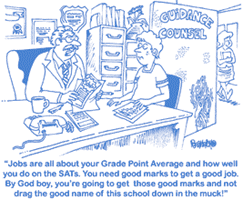
School administrators, not to be outdone, will
have no hesitation in conveying to students that they are not pulling
their weight, that by their bad behavior or laziness they are letting
down the school or even dragging the good name of
the school down into the muck, that they are
unworthy of the excellent facilities, teachers, and opportunity the
school is offering them. The whole idea of helping the student to learn
has been eclipsed by concerns for the school itself, its survival,
growth, and accumulation of
prestige. John Holt continues in "The Underachieving School".
 "I do not think it is in any way an
exaggeration to say that many students, particularly the ablest ones
are being as mercilessly exploited by ambitious schools as they are by
business and commerce, which use them as consumers and subject them to
heavy and destructive psychological pressures." "I do not think it is in any way an
exaggeration to say that many students, particularly the ablest ones
are being as mercilessly exploited by ambitious schools as they are by
business and commerce, which use them as consumers and subject them to
heavy and destructive psychological pressures."
 The Work Load of
Students. The Work Load of
Students.
 In his book
"The Underachieving School" John Holt continues to explain
how homework starts to pile up from about the age of thirteen. In his book
"The Underachieving School" John Holt continues to explain
how homework starts to pile up from about the age of thirteen.
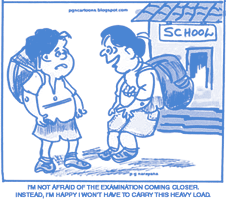 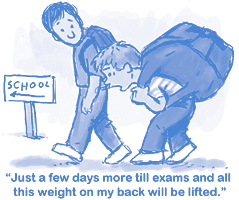
 "In such schools, children from the
age of twelve or thirteen on are very likely to have after a long day
at school, two, three or more hours of homework a night - with more
over the week-end. The load grows heavier as children get older. Long
before they reach college, many children are putting in a seventy-hour
week - or more. Children have not worked such long hours since the
early and brutal days of the Industrial Revolution." "In such schools, children from the
age of twelve or thirteen on are very likely to have after a long day
at school, two, three or more hours of homework a night - with more
over the week-end. The load grows heavier as children get older. Long
before they reach college, many children are putting in a seventy-hour
week - or more. Children have not worked such long hours since the
early and brutal days of the Industrial Revolution."
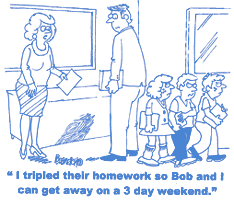
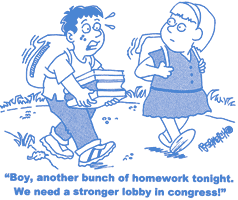
 "One of my own students, a girl just
turned fourteen, said not long ago, more in the spirit of wry
amusement than of complaint, that she went home every night on a
commuter train with businessmen, most of whom could look forward to an
evening of relaxation with their families, while she had at least two
or three hours' more work to
do. And probably a good many of those men find their work during the
day less difficult and demanding than her schoolwork is for her." "One of my own students, a girl just
turned fourteen, said not long ago, more in the spirit of wry
amusement than of complaint, that she went home every night on a
commuter train with businessmen, most of whom could look forward to an
evening of relaxation with their families, while she had at least two
or three hours' more work to
do. And probably a good many of those men find their work during the
day less difficult and demanding than her schoolwork is for her."
 The Effects of these Pressures on Students.
The effects of these pressures on children are many and all harmful.
John Holt in his book
"The Underachieving School"
suggests the following.
The Effects of these Pressures on Students.
The effects of these pressures on children are many and all harmful.
John Holt in his book
"The Underachieving School"
suggests the following.
-
A need to be always right and never wrong.
 "They create in young people an
exaggerated concern with getting right answers and avoiding mistakes;
they drive them into defensive strategies of learning and behavior that
choke off their intellectual powers and make
real learning all but impossible." "They create in young people an
exaggerated concern with getting right answers and avoiding mistakes;
they drive them into defensive strategies of learning and behavior that
choke off their intellectual powers and make
real learning all but impossible."
-
An inability to sort out their beliefs or
establish an identity.
 [On Teenagers] "In short, it is at
this time that he begins not only to know himself but also consciously
to create himself, to feel intuitively what Thoreau meant when he said
that every man is his own masterpiece... A person's identity is made up
of those things - qualities, tastes, beliefs - that are uniquely his...
More specifically, it is the people he admires, the books, the music,
the games, the interests, that he chooses for
himself and likes, whether or not anyone else likes them, or whether or
not they are supposed to be 'good' or 'worthwhile'; the experiences
that he needs to seek out for himself and that add to his life. An
adolescent needs time to do this kind of seeking, tasting, selecting
and rejecting... We do not give him enough." [On Teenagers] "In short, it is at
this time that he begins not only to know himself but also consciously
to create himself, to feel intuitively what Thoreau meant when he said
that every man is his own masterpiece... A person's identity is made up
of those things - qualities, tastes, beliefs - that are uniquely his...
More specifically, it is the people he admires, the books, the music,
the games, the interests, that he chooses for
himself and likes, whether or not anyone else likes them, or whether or
not they are supposed to be 'good' or 'worthwhile'; the experiences
that he needs to seek out for himself and that add to his life. An
adolescent needs time to do this kind of seeking, tasting, selecting
and rejecting... We do not give him enough."
-
An excessive concern with what others think of
them.
 "In addition by putting him in a
position where he is always being judged and where his whole future may
depend on those judgments, we require the adolescent to direct his
attention, not to who he is or ought to be or
wants to be but who we think he is and want him to be. He has to keep
thinking about the impression he is making on us - his elders, the
world. Thus we help to exaggerate what is already, in most young
people, a serious and crippling
fault - an excessive concern with what others think of them." "In addition by putting him in a
position where he is always being judged and where his whole future may
depend on those judgments, we require the adolescent to direct his
attention, not to who he is or ought to be or
wants to be but who we think he is and want him to be. He has to keep
thinking about the impression he is making on us - his elders, the
world. Thus we help to exaggerate what is already, in most young
people, a serious and crippling
fault - an excessive concern with what others think of them."
-
A loss of their own sense of worth.
 "Since our judgments are more often
than not critical, unfavorable, even harsh, we exaggerate another
fault, equally serious and crippling - a tendency to imagine that other
people think less well of them than
in fact they do, or what is worse, that they do not deserve to be well
thought of. Youth ought to be a time when people acquire a sense not
just of their own identity but also of their own worth. We make it
almost certain to be the very opposite... More and more the only
acceptable goal is to get into a prestige college; to do anything else
is to fail. Thus I hear boys and girls say, 'I wanted to go to
so-and-so, but I'm not good enough.' It is outrageous
that they should think this way, that they should judge themselves
stupid and worthless because of the opinion of some remote college
admissions officer." "Since our judgments are more often
than not critical, unfavorable, even harsh, we exaggerate another
fault, equally serious and crippling - a tendency to imagine that other
people think less well of them than
in fact they do, or what is worse, that they do not deserve to be well
thought of. Youth ought to be a time when people acquire a sense not
just of their own identity but also of their own worth. We make it
almost certain to be the very opposite... More and more the only
acceptable goal is to get into a prestige college; to do anything else
is to fail. Thus I hear boys and girls say, 'I wanted to go to
so-and-so, but I'm not good enough.' It is outrageous
that they should think this way, that they should judge themselves
stupid and worthless because of the opinion of some remote college
admissions officer."
-
A loss of their sense of power, purpose and
mission in life.
 The pressures we put on young people
also tend to destroy their sense of power and purpose... "This, I
think, what Paul Goodman meant when he said that we have imposed on the
elite of our younger generation a morale fit for slaves. We have given
them a sense not of mission and vocation, but of subjection and
slavery. They do not seek more knowledge and power so that they may one
day do great work of their own choosing; instead, they do their tasks,
doggedly and often well because they dare not refuse." The pressures we put on young people
also tend to destroy their sense of power and purpose... "This, I
think, what Paul Goodman meant when he said that we have imposed on the
elite of our younger generation a morale fit for slaves. We have given
them a sense not of mission and vocation, but of subjection and
slavery. They do not seek more knowledge and power so that they may one
day do great work of their own choosing; instead, they do their tasks,
doggedly and often well because they dare not refuse."
-
A loss of their sense of joy or pleasure in both
work and play.
 "Along with their sense of mission,
we destroy to a very considerable extent their sense of joy, both in
work and leisure. Thoreau once wrote: 'The truly efficient laborer will
not crowd his day with work, but saunter to the task surrounded by a
wide halo of ease and leisure.' The man is badly cheated who has never
felt that he could not wait to get back to his work and, so feeling,
hurled himself into it with a fierce joy. Not only
is he cheated; the work he does is probably neither well done nor much
worth doing." "Along with their sense of mission,
we destroy to a very considerable extent their sense of joy, both in
work and leisure. Thoreau once wrote: 'The truly efficient laborer will
not crowd his day with work, but saunter to the task surrounded by a
wide halo of ease and leisure.' The man is badly cheated who has never
felt that he could not wait to get back to his work and, so feeling,
hurled himself into it with a fierce joy. Not only
is he cheated; the work he does is probably neither well done nor much
worth doing."
 The Consequences of these Pressures for Society.
John Holt in his book
"The Underachieving School" suggests the following.
The Consequences of these Pressures for Society.
John Holt in his book
"The Underachieving School" suggests the following.
-
An increase in psychological disturbance.
-
An increase in suicide.
-
An increase in overuse of alcohol and drug use.
-
An increase in cheating.

 "We also read of a great increase in
all kinds of cheating, not among unsuccessful students, but among
superior students whose grades would be very good even if they did not
cheat. It is no small thing that large numbers of our young people,
supposedly our ablest and best, are becoming convinced that they must
cheat in order to
succeed; that success is so important that it justifies cheating." "We also read of a great increase in
all kinds of cheating, not among unsuccessful students, but among
superior students whose grades would be very good even if they did not
cheat. It is no small thing that large numbers of our young people,
supposedly our ablest and best, are becoming convinced that they must
cheat in order to
succeed; that success is so important that it justifies cheating."

-
A debasement and corruption of the act of
learning.
 "But the broader and more general
consequence of the pressure for grades is that it has debased and
corrupted the act of learning itself. Not by what we say but by what we
do, by the way we hand out rewards and prizes,
we convince many young people that it is not for the joy and
satisfaction of understanding that we learn but in order to get
something for ourselves; and what counts in school and college is not
knowing and understanding, but making someone think you know and
understand; that knowledge is valuable , not because it helps us deal
better with the problems of private and public life, but because it has
become a commodity that can be sold for fancy prices on the market.
School has become a kind of racket, and success in school and hence in
life, depends on learning how to beat it." "But the broader and more general
consequence of the pressure for grades is that it has debased and
corrupted the act of learning itself. Not by what we say but by what we
do, by the way we hand out rewards and prizes,
we convince many young people that it is not for the joy and
satisfaction of understanding that we learn but in order to get
something for ourselves; and what counts in school and college is not
knowing and understanding, but making someone think you know and
understand; that knowledge is valuable , not because it helps us deal
better with the problems of private and public life, but because it has
become a commodity that can be sold for fancy prices on the market.
School has become a kind of racket, and success in school and hence in
life, depends on learning how to beat it."
 Raising the Hoop.
If there is one single thing that makes schools a rat race more than
any other, it is this; that no matter how well
students may do at school, it is never enough. If too many students
pass a test they simply make the test harder.
Raising the Hoop.
If there is one single thing that makes schools a rat race more than
any other, it is this; that no matter how well
students may do at school, it is never enough. If too many students
pass a test they simply make the test harder.
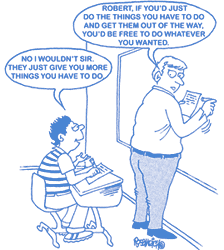
John Holt in his book
"The Underachieving School" puts it like this.
 "I think of a student of mine, years
ago, kept on campus week-end after week-end, for not having his work
done - presumably so that he could use the time to get it done. On one
such week-end, I found him working on one of his hobbies, a small
printing press. In exasperation I said to him, 'If you'd just do the
things you have to do and get them out of the way, then you could be
free to do the things you want to do.' "I think of a student of mine, years
ago, kept on campus week-end after week-end, for not having his work
done - presumably so that he could use the time to get it done. On one
such week-end, I found him working on one of his hobbies, a small
printing press. In exasperation I said to him, 'If you'd just do the
things you have to do and get them out of the way, then you could be
free to do the things you want to do.'
With tired wisdom far greater than mine, he said,
mildly: 'No
you can't. They just give you more things you have to do.' It is truer
now than it was then. Schools cannot bring themselves to say, 'That's
enough.' No matter how high they raise the hoop, if a child manages to
jump through it, they take his success as a signal that they must raise
it still higher."
Can the Schools be Changed so as to Stop
or Avoid the Rat Race? John Holt is a bit pessimistic about
this as follows from
"The Underachieving School".
 "Can the schools and colleges be
persuaded to do away with, or greatly reduce, their demands for high
grades? There are many reasons for thinking they cannot. "Can the schools and colleges be
persuaded to do away with, or greatly reduce, their demands for high
grades? There are many reasons for thinking they cannot.
-
First, they do not seem aware of the harm that
their competition for prestige is doing to American youth and American
education. In fact they take quite an opposite view, talking about
higher standards and upgrading education.
-
Second, they would say that they have found from
experience that it is the students with high test scores who have the
best chance of staying in college. But this because so
much of their teaching is based on getting high test scores; if they
reduced the importance of exams and marks, they
would reduce the need for getting only those students who were good at
taking exams.
-
Third, the colleges would say that unless they
make entrance difficult by demanding high test scores, they will have
too many applicants to choose from. But they have too many
as it is, and must ultimately make many choices on the basis of
criteria other than test scores. Why not make those criteria more
important and if they still have too many applicants, choose from them
by lot? Under such a system, a student applying to a popular college
would know that his chances of being admitted were slight, but would
feel, if he was not admitted, that it was chance that kept him out -
not that he was no good."
How can Schools be Changed?
Well, we can dream, but there are indeed many things the colleges can
do, many things the students and prep. schools can do. John Holt in his
book
"The Underachieving School" makes a few suggestions.
 "Our schools have let themselves
think that all the bargaining power lies with the colleges. But
this not so. Our prestige colleges need good students as much as the
students need the colleges. Suppose more and more schools began saying
to colleges, 'Our best students are fed up with grinding for grades;
they want to learn for the interest and joy of learning. Unless you
show them, and us, that you are making grades less important, they are
going to look for other colleges to go to, and we are going to help
them.' Might this not change the picture?
After all pressure can be exerted both ways." "Our schools have let themselves
think that all the bargaining power lies with the colleges. But
this not so. Our prestige colleges need good students as much as the
students need the colleges. Suppose more and more schools began saying
to colleges, 'Our best students are fed up with grinding for grades;
they want to learn for the interest and joy of learning. Unless you
show them, and us, that you are making grades less important, they are
going to look for other colleges to go to, and we are going to help
them.' Might this not change the picture?
After all pressure can be exerted both ways."
 "Perhaps a number of prestige
colleges could be persuaded to agree to say jointly that they would
admit some fixed percentage of applicants each year, despite low test
scores, if the applicants had other important qualifications. If they
found, as I believe they would, that such students were on the whole as
useful and valuable as students getting very high scores, they could
raise the percentage. Such a policy would encourage primary and
secondary schools and teachers to work for goals other than high test
scores, and it would give hope to at least a number of very talented
young people who are not good at taking exams." "Perhaps a number of prestige
colleges could be persuaded to agree to say jointly that they would
admit some fixed percentage of applicants each year, despite low test
scores, if the applicants had other important qualifications. If they
found, as I believe they would, that such students were on the whole as
useful and valuable as students getting very high scores, they could
raise the percentage. Such a policy would encourage primary and
secondary schools and teachers to work for goals other than high test
scores, and it would give hope to at least a number of very talented
young people who are not good at taking exams."
 "Taking the longer view, I cannot
see why any college should not admit anyone and everyone who applied
for admission. What if they get filled up? Then let them do what the
theatre or movie house or concert or lecture hall does - hang out a
sign that there is no more room, and that people will have to wait for
the next performance. If someone wants so badly to go to Hotshot U.
that he will wait four years to get in, then they would be wise to let
him wait in line until there is room. Most students will quite sensibly
go to other places nearly as good where the line is not so long. Let
overcrowding be the students' problem, not the institution's. In the
same way, let a student judge whether or not he will be able to do the
work at a college. If I go to a concert hall to hear a difficult piece
of music, nobody gives me an exam at the door to make sure I going to
be able to understand it. It may in fact be too difficult and I may not
understand or like it, and so waste my time and money.
That is my risk and my misfortune. The same is true when I buy a book,
or go to a play, or to a lecture or a museum. Let the student take the
same risk." "Taking the longer view, I cannot
see why any college should not admit anyone and everyone who applied
for admission. What if they get filled up? Then let them do what the
theatre or movie house or concert or lecture hall does - hang out a
sign that there is no more room, and that people will have to wait for
the next performance. If someone wants so badly to go to Hotshot U.
that he will wait four years to get in, then they would be wise to let
him wait in line until there is room. Most students will quite sensibly
go to other places nearly as good where the line is not so long. Let
overcrowding be the students' problem, not the institution's. In the
same way, let a student judge whether or not he will be able to do the
work at a college. If I go to a concert hall to hear a difficult piece
of music, nobody gives me an exam at the door to make sure I going to
be able to understand it. It may in fact be too difficult and I may not
understand or like it, and so waste my time and money.
That is my risk and my misfortune. The same is true when I buy a book,
or go to a play, or to a lecture or a museum. Let the student take the
same risk."
Getting out of the
Rat Race. So what is the answer? Must students extract
themselves from the rat race, should teachers help them to extract
themselves, should parents ease up on the pressure, or should the
institutions of education remodel themselves so that a rat race never
begins? The answer is of course, all of the above. Students should be
trying to live up to their own expectations. They should gradually
change, to become people who increasingly take pleasure in everything
they do. They should find pleasure in everything they learn. The
pleasure should be in the journey, in the feeling of improvement, and
ever increasing competence. The outcome from this can only be
students/people who are more intelligent, more creative, more motivated
and who will have a life long love affair with learning.
|














 Who or What is Responsible? Well
certainly parents are responsible, the community, society and culture
must
all take some responsibility, but the schools themselves must accept
the major share of the blame. In his book
Who or What is Responsible? Well
certainly parents are responsible, the community, society and culture
must
all take some responsibility, but the schools themselves must accept
the major share of the blame. In his book  Pressure and Manipulation.
Pressure and Manipulation. 
 Guilt.
Although the major tool for manipulating students into working harder
is fear, the teachers, administrators, and other interested parties in
education have other tools as well; bribery, irony, sarcasm and of
course guilt. Guilt is the important one. Parents will say "I have
worked my fingers to the bone to send you to the best school I can, and
this how you repay me." There follows any or all of the following; by
getting low marks, not working hard, loafing, being lazy, and of course
the big no no 'failing'. Teachers also use this ploy. They will try to
tell students that by not working hard enough they are unworthy of the
extra time and effort, he the teacher, has put into trying to help
them; that they are ungrateful for his concern and patience; and do not
deserve to be showered with the brilliant gems of wisdom and knowledge
he has so kindly unlocked for them.
Guilt.
Although the major tool for manipulating students into working harder
is fear, the teachers, administrators, and other interested parties in
education have other tools as well; bribery, irony, sarcasm and of
course guilt. Guilt is the important one. Parents will say "I have
worked my fingers to the bone to send you to the best school I can, and
this how you repay me." There follows any or all of the following; by
getting low marks, not working hard, loafing, being lazy, and of course
the big no no 'failing'. Teachers also use this ploy. They will try to
tell students that by not working hard enough they are unworthy of the
extra time and effort, he the teacher, has put into trying to help
them; that they are ungrateful for his concern and patience; and do not
deserve to be showered with the brilliant gems of wisdom and knowledge
he has so kindly unlocked for them. The Work Load of
Students.
The Work Load of
Students.
 In his book
In his book 

 The Effects of these Pressures on Students.
The effects of these pressures on children are many and all harmful.
John Holt in his book
The Effects of these Pressures on Students.
The effects of these pressures on children are many and all harmful.
John Holt in his book  The Consequences of these Pressures for Society.
John Holt in his book
The Consequences of these Pressures for Society.
John Holt in his book 

 Raising the Hoop.
If there is one single thing that makes schools a rat race more than
any other, it is this; that no matter how well
students may do at school, it is never enough. If too many students
pass a test they simply make the test harder.
Raising the Hoop.
If there is one single thing that makes schools a rat race more than
any other, it is this; that no matter how well
students may do at school, it is never enough. If too many students
pass a test they simply make the test harder.
